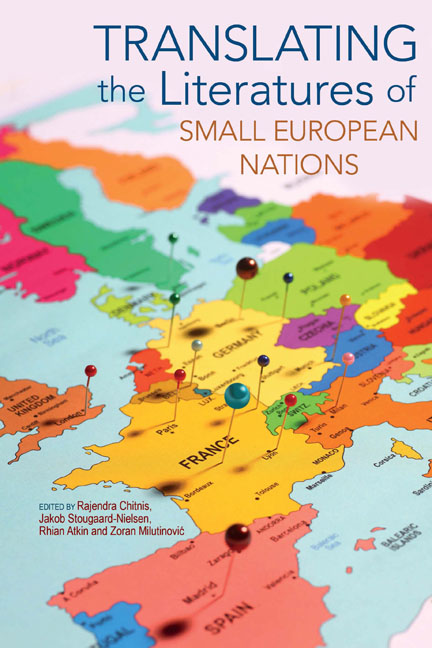Book contents
- Frontmatter
- Contents
- Acknowledgements
- Introduction
- 1 The Global Presentation of Small National Literatures: South Slavs in Literary History and Theory
- 2 Translators as Ambassadors and Gatekeepers: The Case of South Slav Literature
- 3 Supply-driven Translation: Compensating for Lack of Demand
- 4 Literature as Cultural Diplomacy: Czech Literature in Great Britain, 1918–38
- 5 Exporting the Canon: The Mixed Experience of the Dutch Bibliotheca Neerlandica
- 6 Creative Autonomy and Institutional Support in Contemporary Slovene Literature
- 7 Strategies for Success? Evaluating the Rise of Catalan Literature
- 8 Gender, Genre and Nation: Nineteenth-century Swedish Women Writers on Export
- 9 Translating as Re-telling: On the English Proliferation of C.P. Cavafy
- 10 Criminal Peripheries: The Globalization of Scandinavian Crime Fiction and Its Agents
- 11 Literary Translation and Digital Culture: The Transmedial Breakthrough of Poland's The Witcher
- 12 Towards a Multilingual Poetics: Self-translation, Translingualism and Maltese Literature
- 13 Does Size Matter? Questioning Methods for the Study of ‘Small’
- Coda: When Small is Big and Big is Small
- Index
8 - Gender, Genre and Nation: Nineteenth-century Swedish Women Writers on Export
- Frontmatter
- Contents
- Acknowledgements
- Introduction
- 1 The Global Presentation of Small National Literatures: South Slavs in Literary History and Theory
- 2 Translators as Ambassadors and Gatekeepers: The Case of South Slav Literature
- 3 Supply-driven Translation: Compensating for Lack of Demand
- 4 Literature as Cultural Diplomacy: Czech Literature in Great Britain, 1918–38
- 5 Exporting the Canon: The Mixed Experience of the Dutch Bibliotheca Neerlandica
- 6 Creative Autonomy and Institutional Support in Contemporary Slovene Literature
- 7 Strategies for Success? Evaluating the Rise of Catalan Literature
- 8 Gender, Genre and Nation: Nineteenth-century Swedish Women Writers on Export
- 9 Translating as Re-telling: On the English Proliferation of C.P. Cavafy
- 10 Criminal Peripheries: The Globalization of Scandinavian Crime Fiction and Its Agents
- 11 Literary Translation and Digital Culture: The Transmedial Breakthrough of Poland's The Witcher
- 12 Towards a Multilingual Poetics: Self-translation, Translingualism and Maltese Literature
- 13 Does Size Matter? Questioning Methods for the Study of ‘Small’
- Coda: When Small is Big and Big is Small
- Index
Summary
Today, as Jakob Stougaard-Nielsen discusses in Chapter Ten of this volume, Swedish literature is more widely translated and circulated than most literatures written in small languages. Swedish is only spoken by about ten million people and ranks as the ninetieth most spoken language worldwide. As an exporter of literature, however, Sweden has figured in the top 20 since the 1970s. Although literary imports exceed exports, Swedish is therefore currently more prominent as a literary language than might be expected (Svedjedal, 2012, 24–38). This chapter focuses on important, yet hitherto neglected parts of this story, which can and should be viewed in a much longer perspective. There are no reliable statistics before the mid-twentieth century, but research within the project Swedish Women Writers on Export in the Nineteenth Century has been able to show that Sweden had established its position as a literary European nation in the nineteenth century first and foremost through the international success of women novelists.
In the early nineteenth century, Swedish literature, like many other small literatures, was ‘discovered’ for the first time by a wider, international audience. The present chapter examines this process by highlighting two contrasting cases of female authorship: the Romantic poet, Julia Nyberg (1785–1854) and the international bestselling novelist, Emilie Flygare-Carlén (1807–92). As their examples reveal, the opportunities for the translation and reception of smaller literatures changed in Europe and America during the century. This was due not only to developments in book markets and readerships and fluctuations in the political climate, but also to shifting expectations and publication patterns relating to different combinations of genre, nationality and gender. The modest international reception of Nyberg's work was shaped by a complex exchange between domestic and international images of gender and nationality. It was fuelled by a desire for knowledge – even superficial knowledge – of other literatures and cultures, and functioned as part of different individual, regional and national identity projects. By contrast, Flygare-Carlén became a thoroughly international writer, whose novels in the mid-nineteenth century served as identification objects, entertainment and cultural commodities for large groups of readers. Ultimately, however, the strong gendering of the reception proved doubleedged for both, creating opportunities as well as limitations.
- Type
- Chapter
- Information
- Translating the Literatures of Small European Nations , pp. 145 - 164Publisher: Liverpool University PressPrint publication year: 2019



